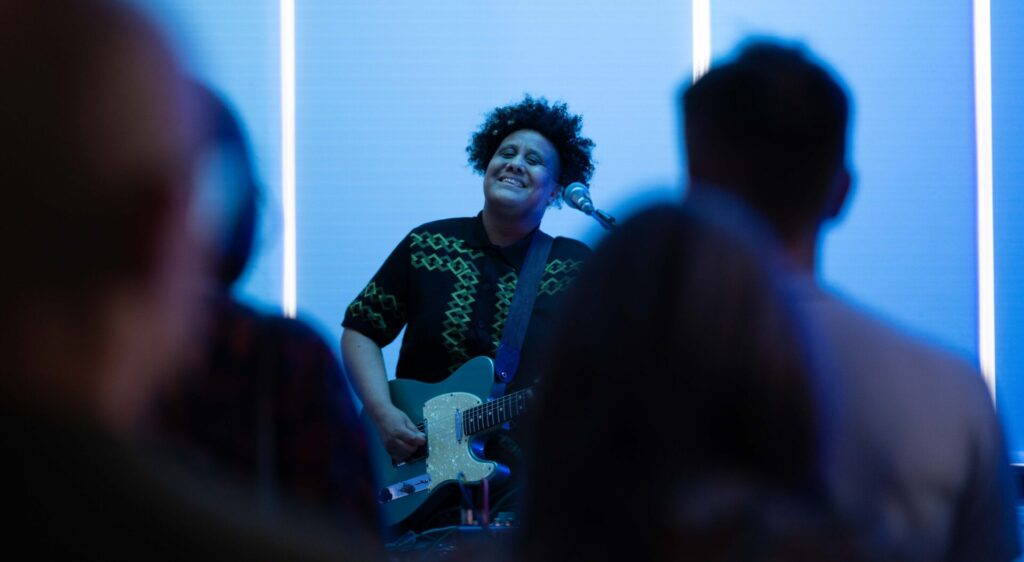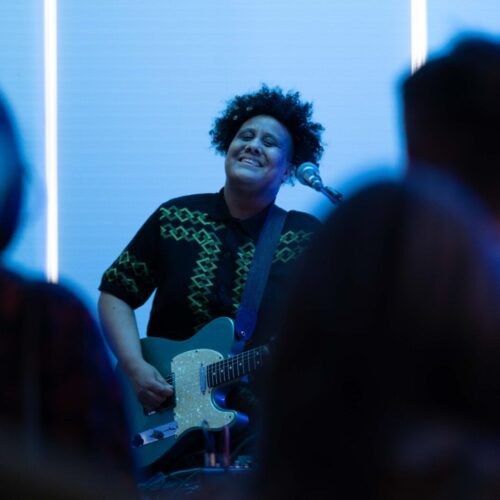“I was aware of it as a healing practice because I was directly responding to a need and a lack that I was feeling,” reflects Ray Aggs. “To be able to just serve that and create something that was, at least in the moment, pretty cathartic, and then take it on tour with me was really nice. That’s something I’ll try to remember to do with future projects: If I’m feeling lonely, or I’m feeling disconnected from people, I can use music as a way to soothe that and as a way to connect. All I need to do is respond sonically to what I need to feel in my body”.
They’re speaking to tQ about their work at Sounds From The Other City’s Samarbeta Music Residency in Salford, as the music they created there is made available to our subscribers under the name R. Aggs. Samarbeta is a Swedish word meaning to work together, to collaborate, or to cooperate, which has reflected the project’s ethos since its launch in 2013. It facilitates artists with the means to produce considered work, in a similar manner to how the visual arts sector structures such opportunities. Earlier this year, multi-instrumentalist and songwriter Aggs spent 10 days at the Islington Mill, with the desire to “[engage] with folk music as a person of colour”.
Speaking to tQ over Zoom, Aggs explains: “That was something I’d been thinking a lot about because I love folk music and I play with my family, but it’s a very present thing when you’re a brown person that playing folk can be quite isolating. You’re very aware of that, especially since the music deals with so many issues of heritage and roots. As a person of a diaspora, whose ancestors are displaced, there’s a lot of friction there to think about it emotionally.”
Folk music has been a constant in Aggs’ life since attending sessions as a child with their parents (their mum plays double bass, their dad the banjo), performing at home and, more recently, starting a POC-only folk session in Glasgow. Their public-facing music career has been more closely aligned with punk and indie, however, primarily as a member of Sacred Paws, Shopping and Trash Kit. “It was quite a subconscious thing, moving away from what I was brought up doing,” Aggs says. “I considered them as really different things; punk music was about being in a community with other young queer people while folk music was about being at home with my family.
“There’s also something about the solace I found within the punk community. I really felt like these are my people. They gave me the empowerment and support I needed not just to make music but get through life. I didn’t necessarily feel that with folk. Folk seemed more like something where you’ve got to be really fucking good at your instrument if you want to be a folk musician. It’s quite daunting, and I didn’t necessarily feel like it was a space that I could just mess about in. I was like, ‘OK, this stays as something I do for myself at home’. In saying that, I always had an inkling that folk and punk are kind of the same because it’s music that you make for yourself. Primarily, it’s not necessarily about getting on a massive stage or releasing records. It’s about building community. And, it’s about family for me”.
Setting up in Salford, Aggs entered the residency with little material pre-planned, other than picking out instruments they wanted for recording; an acoustic guitar, a banjo, their fiddle and a handmade mbira from Zimbabwe bearing a luminous motif: ‘Through The Wind’. “I wanted to make sure the mbira was on these songs because folk music has a practical use in life. For me, a lot of it is about healing and Zimbabwean traditional music is healing focused,” says Aggs.
Ready to follow whatever themes, melodies and processes came to them in the moment, Aggs relished the experience. “It was really nice to turn up somewhere and think about specific themes, even though some of them scared me a bit,” the artist explains. “Especially to go somewhere where I only knew a couple of people; I was very alone. I was thinking about roots and belonging and home. These things that were really suddenly quite painful to be thinking about when you’re so alone. I realised that the only way I was going to get through this was to actually write something that will help me feel better and that’s what I did.” Fittingly, one of the three tracks from Aggs available to our subscribers is titled ‘Home’. Despite its brilliantly fervent arrangement of banjo, fiddle, hand claps and drum samples, there’s a pervading sense of darkness and isolation in their commanding performance. Their successful combination of vibrant 90s dance beats with traditional folk-related timbres persists on ‘Tomorrow’ and ‘Through The Wind’.
The sonic palette in Aggs’ songs effectively demonstrates their aim to “write a new folk song” whilst rooting the work in the tradition of the genre, with a timeless universality coursing through the lyrics. “There’s something about simple lyrics that are full of feeling, but don’t necessarily feel like they’re coming from one person. It’s almost like the earth itself is singing about sadness and longing. I would love to write something that has that kind of weight but I’m a little bit daunted by that. I think through forcing myself to try this daunting thing, I realised that’s what I’ve always been doing in my music”.
Along with recording new music, Aggs gave a talk on the topic of decolonising folk music, facilitated songwriting workshops for POC musicians and non-musicians and performed their work at Sounds From The Other City at the end of the residency. The communal aspect to Samarbeta is one that encouraged their creative practice as – having seen how valued the community aspect to their Glasgow folk sessions were – they didn’t want to make art that was “extractive”. “These songs are no exception,” explains Aggs. “ I was worried about it being a solo residency where I’m being so self-involved in writing my songs. In doing the workshop and talk, it felt like, despite the songs coming from a very personal place of longing, it was also about longing to connect. All the songs are about longing for family, longing for the connection to the land and history and people.
“Also, knowing that I had to do the gig at the end was really nice because I had these songs that felt really vulnerable and I’ve gone into this cathartic place but I’ve also got to play them! That made me ask, ‘How can I bring people in?’ My style of songwriting is different when I know that I have to, or I want to, perform. Songs like ‘Home’, where the basis is the hand clap, I really wanted to have that in the song because when I do sessions, I love to get people to clap on the offbeat because it’s something that they really struggle with at first but once you’re in it, you can’t stop! Then, you’re so physically in the song that it feels amazing, even if you’re not playing an instrument.”
Now that time has passed since their time at Samarbeta, did the residency inform how they’ll think about future projects? “I haven’t written any songs since, but I’ve been playing those songs live. A few weeks after I finished the residency, I went on tour with Bikini Kill and I was playing the biggest venues I’ve ever played on my own,” says Aggs with a smile. “It was amazing to take them from a very private space of being alone with them, and then playing them in these huge spaces to 2,000 people. I think I’ll definitely go forward in the same way with songwriting because I’m really excited that I’ve managed to connect folk with whatever else it is that I do, and that it happened really naturally and spontaneously. It was really interesting to realise that this is probably what I’ve been doing all along. I just wasn’t calling it folk. I probably still wouldn’t necessarily call it folk, but I’m really happy to know that there’s an essence of that running through the music I make.”
To hear R. Aggs’ Samarbeta 021, support the Quietus with Subscriber Plus
…


